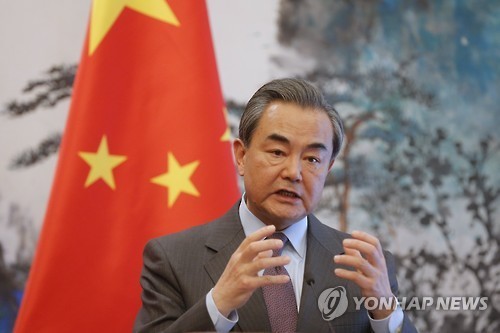China's top diplomat renews strong objection to THAAD deployment
By KH디지털2Published : March 8, 2017 - 15:09
China's top diplomat on Wednesday voiced his strong objection to the deployment of an advanced US missile defense system in South Korea, calling it a mistake that threatens Seoul's security going forward.
Chinese Foreign Minister Wang Yi made the renewed opposition as Seoul and Washington recently started the process of deploying the Terminal High Altitude Area Defense system in South Korea.
During his meeting with press on the sidelines of the annual session of China's parliament, Wang said that the deployment is the "wrong" decision, adding it poses the biggest problem to relations between China and South Korea.
"We urge some forces in South Korea not to keep insisting on taking this path, otherwise the result can only be damaging to others and harm to yourself," the Associated Press quoted Wang as saying during the press meeting.

Earlier Tuesday, South Korea's Defense Ministry and US Forces Korea said they have brought two interceptor-missile launchers and other elements of THAAD into the US base in Osan, south of Seoul.
This marked the beginning of the THAAD deployment that China has vehemently opposed, claiming it can be used against it. South Korea and the U.S. have said it is designed only to defend against North Korean threats.
China has been stepping up what appears to be retaliation against South Korean goods and companies since Seoul and Washington have accelerated the THAAD installation process.
In its immediate response, China's foreign ministry said Tuesday that it "solemnly" objects to the move, vowing to "resolutely take necessary actions in order to safeguard our security interests."
On the overall diplomatic situations on and around the Korean Peninsula, Wang called on all parties to exercise restraint amid growing tensions following North Korea's recent ballistic missile test.
AP quoted him as saying that the escalating tensions among Pyongyang, Seoul and Washington are like "two accelerating trains, coming toward each other with neither side willing to give way."
On Monday, Pyongyang test-fired four ballistic missiles toward the East Sea in an apparent protest against the ongoing military drills between Seoul and Washington. The North has long denounced the exercises as a rehearsal for a northern invasion.
Wang urged the North to stop missile provocations and demanded South Korea and the United States halt the military drills to reduce tension and stop the sides from running on a collision course.
Wang also said that sanctions are just one option to choose from in resolving the North's nuclear issue but no less important is to encourage talks. China will play its part in bringing the nuclear stalemate back to the "negotiation" track, he added, underlining the need for a resolution through talks.
Talks on efforts to make the North go nuclear-free have been halted since the the six-party negotiations involving South and North Korea, the United States, China, Japan and Russia came to a stop in late 2008. North Korea has conducted three nuclear tests in 2006, 2009 and 2013 followed by two more tests in January and September last year. (Yonhap)








![[KH Explains] How should Korea adjust its trade defenses against Chinese EVs?](http://res.heraldm.com/phpwas/restmb_idxmake.php?idx=644&simg=/content/image/2024/04/15/20240415050562_0.jpg&u=20240415144419)










![[Today’s K-pop] Stray Kids to return soon: report](http://res.heraldm.com/phpwas/restmb_idxmake.php?idx=642&simg=/content/image/2024/04/16/20240416050713_0.jpg&u=)